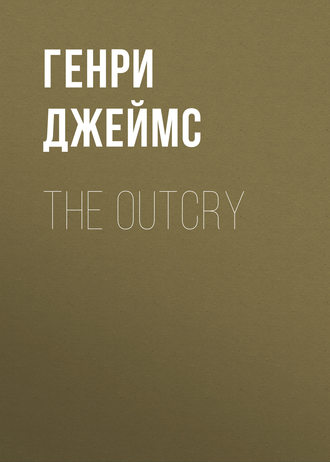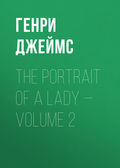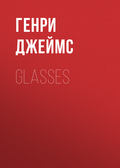
Генри Джеймс
The Outcry
III
“Ah, Mr. Crimble,” he cordially inquired, “you’ve come with your great news?”
Hugh caught the allusion, it would have seemed, but after a moment. “News of the Moretto? No, Mr. Bender, I haven’t news yet.” But he added as with high candour for the visitor’s motion of disappointment: “I think I warned you, you know, that it would take three or four weeks.”
“Well, in my country,” Mr. Bender returned with disgust, “it would take three or four minutes! Can’t you make ‘em step more lively?”
“I’m expecting, sir,” said Hugh good-humouredly, “a report from hour to hour.”
“Then will you let me have it right off?”
Hugh indulged in a pause; after which very frankly: “Ah, it’s scarcely for you, Mr. Bender, that I’m acting!”
The great collector was but briefly checked. “Well, can’t you just act for Art?”
“Oh, you’re doing that yourself so powerfully,” Hugh laughed, “that I think I had best leave it to you!”
His friend looked at him as some inspector on circuit might look at a new improvement. “Don’t you want to go round acting with me?”
“Go ‘on tour,’ as it were? Oh, frankly, Mr. Bender,” Hugh said, “if I had any weight–!”
“You’d add it to your end of the beam? Why, what have I done that you should go back on me—after working me up so down there? The worst I’ve done,” Mr. Bender continued, “is to refuse that Moretto.”
“Has it deplorably been offered you?” our young man cried, unmistakably and sincerely affected. After which he went on, as his fellow-visitor only eyed him hard, not, on second thoughts, giving the owner of the great work away: “Then why are you—as if you were a banished Romeo—so keen for news from Verona?” To this odd mixture of business and literature Mr. Bender made no reply, contenting himself with but a large vague blandness that wore in him somehow the mark of tested utility; so that Hugh put him another question: “Aren’t you here, sir, on the chance of the Mantovano?”
“I’m here,” he then imperturbably said, “because Lord Theign has wired me to meet him. Ain’t you here for that yourself?”
Hugh betrayed for a moment his enjoyment of a “big” choice of answers. “Dear, no! I’ve but been in, by Lady Sandgate’s leave, to see that grand Lawrence.”
“Ah yes, she’s very kind about it—one does go ‘in.’” After which Mr. Bender had, even in the atmosphere of his danger, a throb of curiosity. “Is any one after that grand Lawrence?”
“Oh, I hope not,” Hugh laughed, “unless you again dreadfully are: wonderful thing as it is and so just in its right place there.”
“You call it,” Mr. Bender impartially inquired, “a very wonderful thing?”
“Well, as a Lawrence, it has quite bowled me over”—Hugh spoke as for the strictly aesthetic awkwardness of that. “But you know I take my pictures hard.” He gave a punch to his hat, pressed for time in this connection as he was glad truly to appear to his friend. “I must make my little rapport.” Yet before it he did seek briefly to explain. “We’re a band of young men who care—and we watch the great things. Also—for I must give you the real truth about myself—we watch the great people.”
“Well, I guess I’m used to being watched—if that’s the worst you can do.” To which Mr. Bender added in his homely way: “But you know, Mr. Crimble, what I’m really after.”
Hugh’s strategy on this would again have peeped out for us. “The man in this morning’s ‘Journal’ appears at least to have discovered.”
“Yes, the man in this morning’s ‘Journal’ has discovered three or four weeks—as it appears to take you here for everything—after my beginning to talk. Why, they knew I was talking that time ago on the other side.”
“Oh, they know things in the States,” Hugh cheerfully agreed, “so independently of their happening! But you must have talked loud.”
“Well, I haven’t so much talked as raved,” Mr. Bender conceded—“for I’m afraid that when I do want a thing I rave till I get it. You heard me at Ded-borough, and your enterprising daily press has at last caught the echo.”
“Then they’ll make up for lost time! But have you done it,” Hugh asked, “to prepare an alibi?”
“An alibi?”
“By ‘raving,’ as you say, the saddle on the wrong horse. I don’t think you at all believe you’ll get the Sir Joshua—but meanwhile we shall have cleared up the question of the Moretto.”
Mr. Bender, imperturbable, didn’t speak till he had done justice to this picture of his subtlety. “Then, why on earth do you want to boom the Moretto?”
“You ask that,” said Hugh, “because it’s the boomed thing that’s most in peril.”
“Well, it’s the big, the bigger, the biggest things, and if you drag their value to the light why shouldn’t we want to grab them and carry them off—the same as all of you originally did?”
“Ah, not quite the same,” Hugh smiled—“that I will say for you!”
“Yes, you stick it on now—you have got an eye for the rise in values. But I grant you your unearned increment, and you ought to be mighty glad that, to such a time, I’ll pay it you.”
Our young man kept, during a moment’s thought, his eyes on his companion, and then resumed with all intensity and candour: “You may easily, Mr. Bender, be too much for me—as you appear too much for far greater people. But may I ask you, very earnestly, for your word on this, as to any case in which that happens—that when precious things, things we are to lose here, are knocked down to you, you’ll let us at least take leave of them, let us have a sight of them in London, before they’re borne off?”
Mr. Bender’s big face fell almost with a crash. “Hand them over, you mean, to the sandwich men on Bond Street?”
“To one or other of the placard and poster men—I don’t insist on the inserted human slice! Let the great values, as a compensation to us, be on view for three or four weeks.”
“You ask me,” Mr. Bender returned, “for a general assurance to that effect?”
“Well, a particular one—so it be particular enough,” Hugh said—“will do just for now. Let me put in my plea for the issue—well, of the value that’s actually in the scales.”
“The Mantovano-Moretto?”
“The Moretto-Mantovano!”
Mr. Bender carnivorously smiled. “Hadn’t we better know which it is first?”
Hugh had a motion of practical indifference for this. “The public interest—playing so straight on the question—may help to settle it. By which I mean that it will profit enormously—the question of probability, of identity itself will—by the discussion it will create. The discussion will promote certainty–”
“And certainty,” Mr. Bender massively mused, “will kick up a row.”
“Of course it will kick up a row!”—Hugh thoroughly guaranteed that. “You’ll be, for the month, the best-abused man in England—if you venture to remain here at all; except, naturally, poor Lord Theign.”
“Whom it won’t be my interest, at the same time, to worry into backing down.”
“But whom it will be exceedingly mine to practise on”—and Hugh laughed as at the fun before them—“if I may entertain the sweet hope of success. The only thing is—from my point of view,” he went on—“that backing down before what he will call vulgar clamour isn’t in the least in his traditions, nothing less so; and that if there should be really too much of it for his taste or his nerves he’ll set his handsome face as a stone and never budge an inch. But at least again what I appeal to you for will have taken place—the picture will have been seen by a lot of people who’ll care.”
“It will have been seen,” Mr. Bender amended—“on the mere contingency of my acquisition of it—only if its present owner consents.”
“‘Consents’?” Hugh almost derisively echoed; “why, he’ll propose it himself, he’ll insist on it, he’ll put it through, once he’s angry enough—as angry, I mean, as almost any public criticism of a personal act of his will be sure to make him; and I’m afraid the striking criticism, or at least animadversion, of this morning, will have blown on his flame of bravado.”
Inevitably a student of character, Mr. Bender rose to the occasion. “Yes, I guess he’s pretty mad.”
“They’ve imputed to him”—Hugh but wanted to abound in that sense—“an intention of which after all he isn’t guilty.”
“So that”—his listener glowed with interested optimism—“if they don’t look out, if they impute it to him again, I guess he’ll just go and be guilty!”
Hugh might at this moment have shown to an initiated eye as fairly elated by the sense of producing something of the effect he had hoped. “You entertain the fond vision of lashing them up to that mistake, oh fisher in troubled waters?” And then with a finer art, as his companion, expansively bright but crudely acute, eyed him in turn as if to sound him: “The strongest thing in such a type—one does make out—is his resentment of a liberty taken; and the most natural furthermore is quite that he should feel almost anything you do take uninvited from the groaning board of his banquet of life to be such a liberty.”
Mr. Bender participated thus at his perceptive ease in the exposed aristocratic illusion. “Yes, I guess he has always lived as he likes, the way those of you who have got things fixed for them do, over here; and to have to quit it on account of unpleasant remark—”
But he gave up thoughtfully trying to express what this must be; reduced to the mere synthetic interjection “My!”
“That’s it, Mr. Bender,” Hugh said for the consecration of such a moral; “he won’t quit it without a hard struggle.”
Mr. Bender hereupon at last gave himself quite gaily away as to his high calculation of impunity. “Well, I guess he won’t struggle too hard for me to hold on to him if I want to!”
“In the thick of the conflict then, however that may be,” Hugh returned, “don’t forget what I’ve urged on you—the claim of our desolate country.”
But his friend had an answer to this. “My natural interest, Mr. Crimble—considering what I do for it—is in the claim of ours. But I wish you were on my side!”
“Not so much,” Hugh hungrily and truthfully laughed, “as I wish you were on mine!” Decidedly, none the less, he had to go. “Good-bye—for another look here!”
He reached the doorway of the second room, where, however, his companion, freshly alert at this, stayed him by a gesture. “How much is she really worth?”
“‘She’?” Hugh, staring a moment, was miles at sea. “Lady Sandgate?”
“Her great-grandmother.”
A responsible answer was prevented—the butler was again with them; he had opened wide the other door and he named to Mr. Bender the personage under his convoy. “Lord John!”
Hugh caught this from the inner threshold, and it gave him his escape. “Oh, ask that friend!” With which he sought the further passage to the staircase and street, while Lord John arrived in charge of Mr. Gotch, who, having remarked to the two occupants of the front drawing-room that her ladyship would come, left them together.
IV
“Then Theign’s not yet here!” Lord John had to resign himself as he greeted his American ally. “But he told me I should find you.”
“He has kept me waiting,” that gentleman returned—“but what’s the matter with him anyway?”
“The matter with him”—Lord John treated such ignorance as irritating—“must of course be this beastly thing in the ‘Journal.’”
Mr. Bender proclaimed, on the other hand, his incapacity to seize such connections. “What’s the matter with the beastly thing?”
“Why, aren’t you aware that the stiffest bit of it is a regular dig at you?”
“If you call that a regular dig you can’t have had much experience of the Papers. I’ve known them to dig much deeper.”
“I’ve had no experience of such horrid attacks, thank goodness; but do you mean to say,” asked Lord John with the surprise of his own delicacy, “that you don’t unpleasantly feel it?”
“Feel it where, my dear sir?”
“Why, God bless me, such impertinence, everywhere!”
“All over me at once?”—Mr. Bender took refuge in easy humour. “Well, I’m a large man—so when I want to feel so much I look out for something good. But what, if he suffers from the blot on his ermine—ain’t that what you wear?—does our friend propose to do about it?”
Lord John had a demur, which was immediately followed by the apprehension of support in his uncertainty. Lady Sandgate was before them, having reached them through the other room, and to her he at once referred the question. “What will Theign propose, do you think, Lady Sandgate, to do about it?”
She breathed both her hospitality and her vagueness. “To ‘do’–?”
“Don’t you know about the thing in the ‘Journal’—awfully offensive all round?”
“There’d be even a little pinch for you in it,” Mr. Bender said to her—“if you were bent on fitting the shoe!”
Well, she met it all as gaily as was compatible with a firm look at her elder guest while she took her place with them. “Oh, the shoes of such monsters as that are much too big for poor me!” But she was more specific for Lord John. “I know only what Grace has just told me; but since it’s a question of footgear dear Theign will certainly—what you may call—take his stand!”
Lord John welcomed this assurance. “If I know him he’ll take it splendidly!”
Mr. Bender’s attention was genial, though rather more detached. “And what—while he’s about it—will he take it particularly on?”
“Oh, we’ve plenty of things, thank heaven,” said Lady Sandgate, “for a man in Theign’s position to hold fast by!”
Lord John freely confirmed it. “Scores and scores—rather! And I will say for us that, with the rotten way things seem going, the fact may soon become a real convenience.”
Mr. Bender seemed struck—and not unsympathetic. “I see that your system would be rather a fraud if you hadn’t pretty well fixed that!”
Lady Sandgate spoke as one at present none the less substantially warned and convinced. “It doesn’t, however, alter the fact that we’ve thus in our ears the first growl of an outcry.”
“Ah,” Lord John concurred, “we’ve unmistakably the first growl of an outcry!”
Mr. Bender’s judgment on the matter paused at sight of Lord Theign, introduced and announced, as Lord John spoke, by Gotch; but with the result of his addressing directly the person so presenting himself. “Why, they tell me that what this means, Lord Theign, is the first growl of an outcry!”
The appearance of the most eminent figure in the group might have been held in itself to testify to some such truth; in the sense at least that a certain conscious radiance, a gathered light of battle in his lordship’s aspect would have been explained by his having taken the full measure—an inner success with which he glowed—of some high provocation. He was flushed, but he bore it as the ensign of his house; he was so admirably, vividly dressed, for the morning hour and for his journey, that he shone as with the armour of a knight; and the whole effect of him, from head to foot, with every jerk of his unconcern and every flash of his ease, was to call attention to his being utterly unshaken and knowing perfectly what he was about. It was at this happy pitch that he replied to the prime upsetter of his peace.
“I’m afraid I don’t know what anything means to you, Mr. Bender—but it’s exactly to find out that I’ve asked you, with our friend John, kindly to meet me here. For a very brief conference, dear lady, by your good leave,” he went on to Lady Sandgate; “at which I’m only too pleased that you yourself should assist. The ‘first growl’ of any outcry, I may mention to you all, affects me no more than the last will–!”
“So I’m delighted to gather”—Lady Sandgate took him straight up—“that you don’t let go your inestimable Cure.”
He at first quite stared superior—“‘Let go’?”—but then treated it with a lighter touch. “Upon my honour I might, you know—that dose of the daily press has made me feel so fit! I arrive at any rate,” he pursued to the others and in particular to Mr. Bender, “I arrive with my decision taken—which I’ve thought may perhaps interest you. If that tuppeny rot is an attempt at an outcry I simply nip it in the bud.”
Lord John rejoicingly approved. “Absolutely the only way—with the least self-respect—to treat it!”
Lady Sandgate, on the other hand, sounded a sceptical note. “But are you sure it’s so easy, Theign, to hush up a real noise?”
“It ain’t what I’d call a real one, Lady Sandgate,” Mr. Bender said; “you can generally distinguish a real one from the squeak of two or three mice! But granted mice do affect you, Lord Theign, it will interest me to hear what sort of a trap—by what you say—you propose to set for them.”
“You must allow me to measure, myself, Mr. Bender,” his lordship replied, “the importance of a gross freedom publicly used with my absolutely personal proceedings and affairs; to the cause and origin of any definite report of which—in such circles!—I’m afraid I rather wonder if you yourself can’t give me a clue.”
It took Mr. Bender a minute to do justice to these stately remarks. “You rather wonder if I’ve talked of how I feel about your detaining in your hands my Beautiful Duchess–?”
“Oh, if you’ve already published her as ‘yours’—with your power of publication!” Lord Theign coldly laughed,—“of course I trace the connection!”
Mr. Benders acceptance of responsibility clearly cost him no shade of a pang. “Why, I haven’t for quite a while talked of a blessed other thing—and I’m capable of growing more profane over my not getting her than I guess any one would dare to be if I did.”
“Well, you’ll certainly not ‘get’ her, Mr. Bender,” Lady Sandgate, as for reasons of her own, bravely trumpeted; “and even if there were a chance of it don’t you see that your way wouldn’t be publicly to abuse our noble friend?”
Mr. Bender but beamed, in reply, upon that personage. “Oh, I guess our noble friend knows I have to talk big about big things. You understand, sir, the scream of the eagle!”
“I’ll forgive you,” Lord Theign civilly returned, “all the big talk you like if you’ll now understand me. My retort to that hireling pack shall be at once to dispose of a picture.”
Mr. Bender rather failed to follow. “But that’s what you wanted to do before.”
“Pardon me,” said his lordship—“I make a difference. It’s what you wanted me to do.”
The mystification, however, continued. “And you were not—as you seemed then—willing?”
Lord Theign waived cross-questions. “Well, I’m willing now—that’s all that need concern us. Only, once more and for the last time,” he added with all authority, “you can’t have our Duchess!”
“You can’t have our Duchess!”—and Lord John, as before the altar of patriotism, wrapped it in sacrificial sighs.
“You can’t have our Duchess!” Lady Sandgate repeated, but with a grace that took the sting from her triumph. And she seemed still all sweet sociability as she added: “I wish he’d tell you too, you dreadful rich thing, that you can’t have anything at all!”
Lord Theign, however, in the interest of harmony, deprecated that rigour. “Ah, what then would become of my happy retort?”
“And what—as it is,” Mr. Bender asked—“becomes of my unhappy grievance?”
“Wouldn’t a really great capture make up to you for that?”
“Well, I take more interest in what I want than in what I have—and it depends, don’t you see, on how you measure the size.”
Lord John had at once in this connection a bright idea. “Shouldn’t you like to go back there and take the measure yourself?”
Mr. Bender considered him as through narrowed eyelids. “Look again at that tottering Moretto?”
“Well, its size—as you say—isn’t in any light a negligible quantity.”
“You mean that—big as it is—it hasn’t yet stopped growing?”
The question, however, as he immediately showed, resided in what Lord Theign himself meant “It’s more to the purpose,” he said to Mr. Bender, “that I should mention to you the leading feature, or in other words the very essence, of my plan of campaign—which is to put the picture at once on view.” He marked his idea with a broad but elegant gesture. “On view as a thing definitely disposed of.”
“I say, I say, I say!” cried Lord John, moved by this bold stroke to high admiration.
Lady Sandgate’s approval was more qualified. “But on view, dear Theign, how?”
“With one of those pushing people in Bond Street.” And then as for the crushing climax of his policy: “As a Mantovano pure and simple.”
“But my dear man,” she quavered, “if it isn’t one?”
Mr. Bender at once anticipated; the wind had suddenly risen for him and he let out sail. “Lady Sand-gate, it’s going, by all that’s—well, interesting, to be one!”
Lord Theign took him up with pleasure. “You seize me? We treat it as one!”
Lord John eagerly borrowed the emphasis. “We treat it as one!”
Mr. Bender meanwhile fed with an opened appetite on the thought—he even gave it back larger. “As the long-lost Number Eight!”
Lord Theign happily seized him. “That will be it—to a charm!”
“It will make them,” Mr. Bender asked, “madder than anything?”
His patron—if not his client—put it more nobly. “It will markedly affirm my attitude.”
“Which will in turn the more markedly create discussion.”
“It may create all it will!”
“Well, if you don’t mind it, I don’t!” Mr. Bender concluded. But though bathed in this high serenity he was all for the rapid application of it elsewhere. “You’ll put the thing on view right off?”
“As soon as the proper arrangement–”
“You put off your journey to make it?” Lady Sand-gate at once broke in.
Lord Theign bethought himself—with the effect of a gracious confidence in the others. “Not if these friends will act.”
“Oh, I guess we’ll act!” Mr. Bender declared.
“Ah, won’t we though!” Lord John re-echoed.
“You understand then I have an interest?” Mr. Bender went on to Lord Theign.
His lordship’s irony met it. “I accept that complication—which so much simplifies!”
“And yet also have a liberty?”
“Where else would be those you’ve taken? The point is,” said Lord Theign, “that I have a show.”
It settled Mr. Bender. “Then I’ll fix your show.” He snatched up his hat. “Lord John, come right round!”
Lord John had of himself reached the door, which he opened to let the whirlwind tremendously figured by his friend pass out first. Taking leave of the others he gave it even his applause. “The fellow can do anything anywhere!” And he hastily followed.






